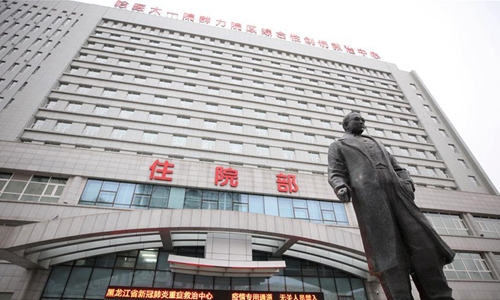
Qunli branch of the First Hospital of Harbin Medical University. (Photo: Xinhua)
Contact tracing of a Chinese national with COVID-19 who returned from the US to Harbin, capital of Northeast China's Heilongjiang Province, shows at least 50 people have contracted the virus after contact with the patient.
Public health experts played down the risks to the wider public, saying a citywide lockdown is unnecessary and Harbin will not become another Wuhan, as long as people do not drop their guard too soon and remain vigilant to the risks of catching the disease.
The man, surnamed Han, flew from the US on March 19. Contact tracing revealed that 50 cases of COVID-19 were related to him, either directly or indirectly, including secondary infections at two hospitals.
Harbin reported 36 active confirmed cases and 18 asymptomatic infections as of Saturday midnight, while the numbers were one and three on April 9 when Han's infection was confirmed.
Some netizens and local residents are calling for a citywide lockdown, but public health experts said it is not necessary as there are no new cases beyond the infection chain, and all close contacts have been traced.
Han first infected a neighbor who came into contact with a contaminated environment. The virus then spread to the neighbor's family members and friends after a dinner gathering.
An 87-year-old patient surnamed Chen is another key link on the infection chain. Chen is a friend of the neighbor's family, who was admitted to Harbin Second Hospital on April 2 after suffering a stroke. He was transferred to the First Affiliated Hospital of Harbin Medical University, and this resulted in infections of at least 26 inpatients, family members and medical staff at the two hospitals.
The infection chain also extended to a driver surnamed Gong, who was confirmed to be an asymptomatic carrier on April 17 after his parents came down with the virus at one of the two hospitals. The driver then came into frequent contact with the employees of two companies for whom he drove over a period of about 10 days. All employees of the two enterprises will undergo COVID-19 tests.
The infection chain further extended to a student and a teacher who were related to cases at Harbin Second Hospital.
A patient from Fushun, a city in neighboring Liaoning Province, was also confirmed on April 16 and found to be related to the cluster of infections in one of the two hospitals.
Such a long infection chain shows that some people in the city may have loosened their vigilance too early and there are loopholes in hospital management, analysts said.
On Friday, the Heilongjiang Provincial Commission for Discipline Inspection announced 18 Party and government officials and hospital chiefs were held accountable for failing to conduct anti-epidemic work in Harbin, including deputy mayor Chen Yuanfei and director of Harbin Health Commission Ding Fengshu.
A "city lockdown is unnecessary for now," said Zeng Guang, chief epidemiologist of the Chinese Center for Disease Control and Prevention, in response to questions over whether Harbin should impose a strict lockdown.
Zeng said Wuhan imposed a city lockdown in January at the beginning of the Spring Festival holidays when there are huge flows of people crisscrossing the country at a time when it was unclear how many people in Hubei Province were infected with the novel coronavirus. The situation in Harbin is clear and there has been a stringent epidemiological investigation in the city, Zeng said.
A city lockdown is the last resort, and the epidemic in Harbin is under control, Zeng said.
Zhou Zijun, a Beijing-based public health expert, told the Global Times that "only when the outbreak is out of control or has a risk of becoming so would the city consider a lockdown." As no further COVID-19 cases were reported beyond the infection chain, a lockdown would be an overreaction, Zhou said.
With a population of more than 10 million, Harbin will not become another Wuhan as the threat of the virus has been recognized and understood, and the majority of the public are maintaining their vigilance, Zhou said, noting many control measures are still in place.
Wang Peiyu, a deputy head of Peking University's school of public health, said that the neighborhood in Harbin is under strict closed-loop management, and agreed that a citywide lockdown is unnecessary.
To prevent imported infections, Harbin customs require drivers and inbound passengers to undergo nucleic acid tests regardless of their nationality. People who return to China, or have to travel between China and a foreign country, for example, truck drivers, will undergo testing or COVID-19 tests every five days, Harbin customs said.


